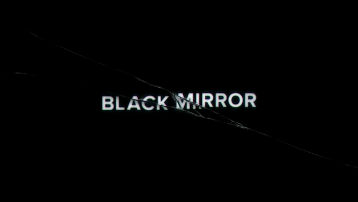 Black Mirror Title Card Netflix
Black Mirror Title Card Netflix The future as depicted in works of science fiction, especially of the multiplex variety, is almost uniformly dystopian. The bleakness of these visions annoys technology enthusiasts, who worry that cumulatively they give machines a bad name. As the headline on an essay in Wired magazine put it, “Stop Writing Dystopian Sci-Fi — It’s Making Us All Fear Technology.”
For sheer pungency of dystopian imagination, it would be hard to beat Black Mirror, an anthology TV series in the style of The Twilight Zone – a different story with a different cast each week – originally produced by the BBC and subsequently continued on Netflix. The title refers to the variety of screens that have proliferated in our daily lives, and that all-too-often seem to dominate them. The twelve episodes produced so far (a new season is in the works) present a consitently dark vision of our technological destinies, not in some galaxy far, far away, but right here, and soon. As the show’s creator, co-executive producer and main writer Charlie Brooker put it, Black Mirror is “about the way we live now – and the way we might be living in 10 minutes’ time if we’re clumsy.”
Indeed, one of the uncanny things about Black Mirror is how plausible the disturbing outcomes it predicts can seem. A cartoon figure who profanely ridicules the proposals of serious politicians comes to power and installs a fascist state. The pursuit of affirmation on social media becomes a desperate drive to be liked at all costs – or else. A man sleeps in a room that is surrounded on all sides by ceiling-high commercials he can’t turn off. Hackers record people’s most intimate moments and blackmail them into performing criminal acts lest their secrets be posted on the Internet for the world to see.
In interviews, Charlie Brookner doesn’t come across as a raging Luddite. To the contrary, he says he’s as much of a gadget freak as anyone, but adds that he also worries about where it’s all heading. This, of course, pretty much sums up the ambivalence most of us feel toward technology. On the popular American radio program Fresh Air Brooker added an interesting elaboration. It isn’t technology per se that scares him, he said: it’s much bigger than that. “I’m quite a paranoid and worried person. I could worry about pretty much anything you put in front of me, so I’m not actually sort of anti-technology…. It’s a fear of everything.”
This points to why shows like Black Mirror, and dystopian science fiction in general, are important: They have the good sense to recognize that things can go horribly wrong. Obviously this can go too far; you don’t want to spend your life hiding beneath the covers. But neither do you want to blithely sally forth on courses of action that might well lead to disaster. The latter course has characterized our general approach to the introduction of powerful new technologies, with predictably unpredictable results.
This is precisely what bothers me about too many technological enthusiasts: They don’t worry nearly enough. Regularly they share with us their almost messianic confidence that the technologies they’re working on will deliver us from every trouble and toil. That anyone would doubt their potential to fulfill that promise seems beyond their comprehension.
The election of Donald Trump as President of the United States, with the help of Russian hackers and boatloads of blatantly deceptive “news” on the Internet, is a case in point. Facebook’s Mark Zuckerberg initially called accusations that fake news influenced the election “a pretty crazy idea” — but eventually conceded that maybe it wasn’t such a crazy idea after all. The denial of a former software engineer for Twitter cracked more quickly. “For my @ twitter alum friends,” he tweeted the day after Trump’s victory, “What did we build?”
Dystopian works of science fiction are, for these reasons, an expression not only of understandable anxiety but of appropriate concern. They could, if taken seriously, serve as petitions for restraint. Unfortunately, as exercises in fiction and entertainment, they are too easily dismissed, overshadowed by the real-world temptations of technological power. Would that the risks they foresee were taken more to heart. To paraphrase the wisdom of one of my favorite bumper stickers: “If you’re not worried, you’re not paying attention.







 JOIN SSIT
JOIN SSIT